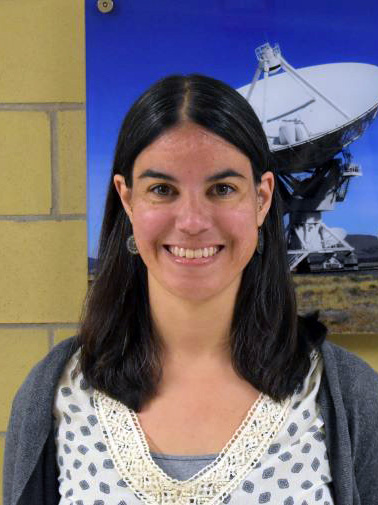Erin Cox Receives NRAO Bob Brown Dissertation Award
Kenneth Kellermann NRAO
 The 2018 Robert L. Brown Outstanding Doctoral Dissertation Award has been awarded to Erin Cox for her dissertation entitled “Probing Planetary Disks: From Birth to Protoplanets." Her thesis was selected for its clear objectives and thoughtful observational approach. Her insights and conclusions make original and significant contributions to our understanding of the early protostellar-cloud collapse process from which planets are forming (or may yet form). The extensive set of new observations and her interpretation provide realistic glimpses into the density and magnetic structures, kinematics, and available energy budgets on resolution scales of a few tens of astronomical units that will guide future magnetohydrodynamic simulations of the conditions under which planets of various masses and orbital radii are likely to form in nascent protostellar cloud complexes. The award will be presented during a ceremony to be held at the National Radio Astronomy Observatory (NRAO) on 21 March 2019.
The 2018 Robert L. Brown Outstanding Doctoral Dissertation Award has been awarded to Erin Cox for her dissertation entitled “Probing Planetary Disks: From Birth to Protoplanets." Her thesis was selected for its clear objectives and thoughtful observational approach. Her insights and conclusions make original and significant contributions to our understanding of the early protostellar-cloud collapse process from which planets are forming (or may yet form). The extensive set of new observations and her interpretation provide realistic glimpses into the density and magnetic structures, kinematics, and available energy budgets on resolution scales of a few tens of astronomical units that will guide future magnetohydrodynamic simulations of the conditions under which planets of various masses and orbital radii are likely to form in nascent protostellar cloud complexes. The award will be presented during a ceremony to be held at the National Radio Astronomy Observatory (NRAO) on 21 March 2019.
Erin received her PhD in 2018 in astronomy from the University of Illinois and her BS in astronomy and physics from the University of Arizona in 2012. She is currently a postdoctoral associate at the Northwestern University Center for Interdisciplinary Exploration and Research in Astrophysics, where she is continuing her studies on star and planet formation focusing on how magnetic fields influence the earliest stages of protostellar collapse and how this affects disk formation.
The Robert L. Brown Outstanding Doctoral Dissertation Award is administered by Associated Universities, Inc. (AUI) and NRAO on behalf of Bob Brown’s friends and family to honor Bob’s life and career. The award is given each year to a recent recipient of a doctoral degree from any recognized degree-granting institution in the United States, that is substantially based on new observational data obtained at any AUI facility and is considered to be of an exceptionally high scientific standard.
Applications for the 2019 Award should be sent to [email protected] no later than 31 December 2019.

